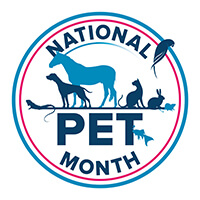Pets: Life Long Companions That Are Good For Our Health
.jpeg)
On Week 1 of #NationalPetMonth we look at research that shows just how our pets are good for us at all times of life and why they have an important role to play in our homes, offices and communities.
Experience 1. It’s been a long day, a tiring day. Maybe it’s been a challenging week.
Job pressures, family concerns, an extra bill you didn’t anticipate. Washed up and worn out. That’s your vibe right now.
But then, as you put down your keys and kick off your shoes, a wagging tail, the pitter patter or thunder of paws, a loud miaow. You smile and know you’re home.
Experience 2. It’s another busy day in the office. Maybe it’s been a challenging week.
Job pressures, colleague concerns, an urgent task you didn’t anticipate. A little stressed and tired. That’s your vibe right now.
But then, as you pick up your coffee cup for a much-needed caffeine hit, you spot them. Big, bright eyes gazing adoringly at you. A tail that won’t stop wagging. You smile and, for a moment, feel just that little bit better.
Two entirely different environments. Two very different days, but the common denominator? Our animal companions. The ultimate pick-me-ups for our mental and physical health.
Sharing our lives with a pet, whether it’s in the home, the office, or elsewhere, benefits us in so many ways.
Numerous studies demonstrate the positive effects of our pets, not just on us as individuals, but on us as families, colleagues and communities.
One of the clearest visual reminders of this is when we see millions of us around the UK out walking our dogs. Whether we’re alone with our pooch or meeting up with friends and their canine companion, evidence suggests that we’re more likely to walk more regularly and reach the recommended amount of walking than non-dog owners.
Dog walking can be a very social activity. Stopping for a chat with a neighbour or delivery driver. Meeting up in a doggy exercise park with our four legged and two legged pals. It gets us moving, motivated and connected.
.jpg)
Across the ‘pond’ it’s no different. Key findings from a survey of US pet owners by HABRI (The Human Animal Bond Research Institute) showed just how the human-animal bond drives actions to improve both human and animal wellbeing.
Pets are so good for us that more than 1 in 5 pet owners said a doctor or therapist had recommended pet ownership. Results show just how the pandemic has accelerated how much pets are front and centre of our lives.
In this latest survey, 76% of pet owners reported that their personal health has improved by owning a pet, up from 71% in 2016, while 87% said they had experienced mental health improvements from sharing their lives with a pet – a 13% increase.
The survey also revealed just how many pet owners spend a big part or most of the day with their pet companions. In all 83% fell into this category – a 5% increase from 2016.
And this quality time spent with our pets seems to have led to more awareness of the benefits.
64% of pet owners reported having had a conversation with someone in the past year about the health benefits of pet ownership and 63% have chatted with their vet about the issue, up from 56% seven years ago.
This US based research also showed how the more pet owners learn about the scientific benefits of the human-animal bond, the more likely they are to take better care of their pets and make significant lifestyle changes to look after their animal companion responsibly.
Part of that is being able to spend quality time with their pets in suitable accommodation.
61% of pet owners said they would change housing so they could have a pet, with 90% agreeing that emergency and temporary housing should accommodate pets and 84% of owners agreeing there should be fewer restrictions on pets in rental accommodation.
In the UK, NOAH (National Office of Animal Health) has been campaigning to secure the right to rent with pets, allowing people to enjoy the benefits of living with companion animals, regardless of the type of tenancy.
In the past, restrictive tenancies have made it challenging for tenants to find suitable and high quality pet-welcoming housing. Research by Zoopla in 2021 reported that just 7% of UK rental properties were listed as suitable for pets, despite research by Battersea in 2022 revealing that 23% of all UK households rent their homes from a private landlord.
The English Private Landlord Survey of 2021 also found that 45% of landlords were unwilling to rent to pet owning tenants, leaving many with the most difficult of decisions to make.
In January 2021, the Government’s Model Tenancy Agreement meant that landlords using that agreement in England would no longer be able to issue blanket bans on pets by default. Instead consent for pets became the default position with landlords having to object in writing within 28 days of a written pet request from a tenant and provide good reason.
“It’s a good start, but landlords do not have to use it..,” says NOAH’s Alison Glennon, who adds: “This was followed last July by a Government White Paper, ‘A Fairer Private Rented Sector’, which includes plans to legislate on removing a landlord’s ability to impose a blanket ban on keeping pets. It also proposed an important change in the law that would allow a landlord to ask that pet damage insurance is held. This change is crucial, as it means that landlords would be better protected against any potential damage caused to their property by pets. If these proposals progress to legislation, it will help both tenants and landlords.”
For more information check out https://www.nrla.org.uk (Landlords) and https://petslets.com (Tenants) and Advocats at https://www.advocatseastmids.org.uk
 Our workplace is another setting where pet companionship can be hugely beneficial.
Our workplace is another setting where pet companionship can be hugely beneficial.
A study by Lincoln University discovered that in general, staff who took their dog to work performed better and felt better.
Those who often took their dog into the office experienced high levels of enthusiasm, energy, persistence, effort, concentration, work-based friendships, pride in their work and general wellbeing.
Even those who only sometimes brought their dog to work reported greater benefits than those who never took their pet into the office.
All this suggests that the presence of a friendly dog in an office may well increase motivation and attention to work.
Research found that those often taking their dog to work with them were more likely to commit long term to a job – great news for employers, eager to lower staff turnover costs.
It also showed that not only did having a dog at work benefit the owner, but it could have a ripple effect on others too.
Previous studies have suggested that the presence of a friendly dog can reduce work-based stress and increase quality of life at work by improving the general atmosphere and working environment.
It can also encourage colleagues to chat with one another more and for owners to stress less about leaving their dog at home unattended.
.jpeg)
Latest research reveals a slow but growing trend of dog friendly offices in the UK. When asked if their workplace had a dog friendly policy, 19% of survey respondents said ‘yes’ – up from just 15% in 2021 and 18% in 2022.
“It’s encouraging to see a slow, but growing trend of dog friendly offices, but we’d love to see more businesses in the UK taking this approach as we know just how much having canine companions in the office can positively impact a team,” says UK Pet Food’s Deputy Chief Executive, Nicole Paley.
If you’re a business keen to develop a pet friendly workspace, check out Purina’s Pets At Work - Resources For Employers where you can follow six steps to make your workplace pawsome.
The companionship we experience by having pets in our lives can be enjoyed at any age and at Lincoln University, a research team is currently leading a project to look at how dogs can help children learn and develop in the classroom.
Look out for more on this exciting project and the positive impact of pets in other settings such as care homes, during National Pet Month (April 1-May 1).
What do you love most about sharing your home or office with a pet? How have they been a great companion for you?
Email your story to asha@turquoisetiger.co.uk along with a pic of you and your pet and you may feature in our 2023 #PetPawsitivity campaign


